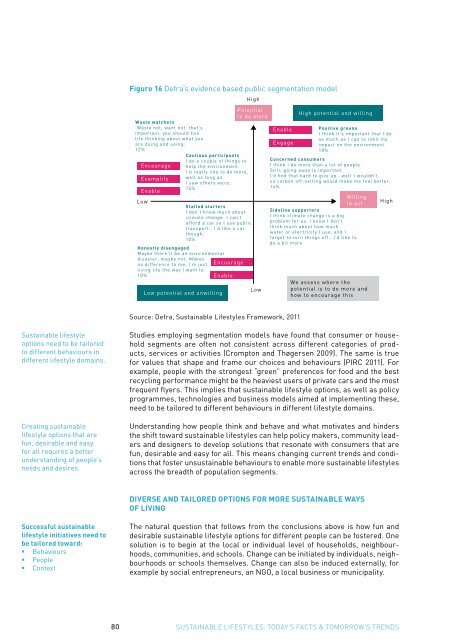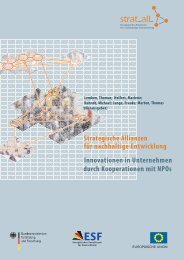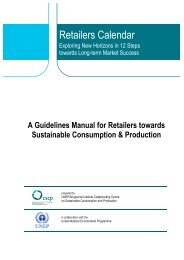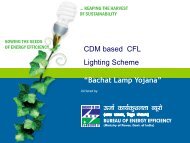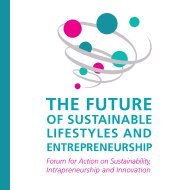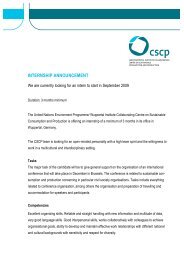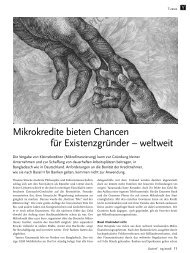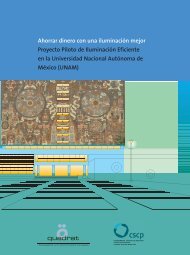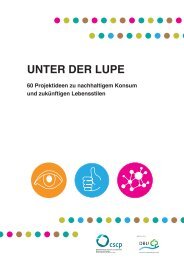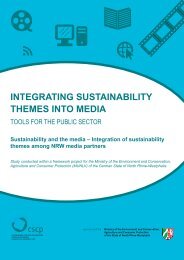today's facts & tomorrow's trends - SPREAD Sustainable Lifestyles ...
today's facts & tomorrow's trends - SPREAD Sustainable Lifestyles ...
today's facts & tomorrow's trends - SPREAD Sustainable Lifestyles ...
Create successful ePaper yourself
Turn your PDF publications into a flip-book with our unique Google optimized e-Paper software.
Figure 16 Defra’s evidence based public segmentation model<br />
Waste watchers<br />
‘Waste not, want not’ that’s<br />
important, you should live<br />
life thinking about what you<br />
are doing and using.<br />
12%<br />
Cautious participants<br />
I do a couple of things to<br />
Encourage help the environment.<br />
I’d really like to do more,<br />
Exemplify well as long as<br />
I saw others were.<br />
14%<br />
Enable<br />
Low<br />
Stalled starters<br />
I don’t know much about<br />
climate change. I can’t<br />
afford a car so I use public<br />
transport.. I’d like a car<br />
though.<br />
10%<br />
Honestly disengaged<br />
Maybe there’ll be an environmental<br />
disaster, maybe not. Makes<br />
no difference to me, I’m just Encourage<br />
living life the way I want to.<br />
18%<br />
Enable<br />
Low potential and unwilling<br />
High<br />
Potential<br />
to do more<br />
Low<br />
Enable<br />
Engage<br />
High potential and willing<br />
Positive greens<br />
I think it’s important that I do<br />
as much as I can to limit my<br />
impact on the environment.<br />
18%<br />
Concerned consumers<br />
I think I do more than a lot of people.<br />
Still, going away is important.<br />
I’d find that hard to give up.. well I wouldn’t,<br />
so carbon off-setting would make me feel better.<br />
14%<br />
Willing<br />
to act<br />
Sideline supporters<br />
I think climate change is a big<br />
problem for us. I know I don’t<br />
think much about how much<br />
water or electricity I use, and I<br />
forget to turn things off.. I’d like to<br />
do a bit more<br />
We assess where the<br />
potential is to do more and<br />
how to encourage this<br />
High<br />
Source: Defra, <strong>Sustainable</strong> <strong>Lifestyles</strong> Framework, 2011<br />
<strong>Sustainable</strong> lifestyle<br />
options need to be tailored<br />
to different behaviours in<br />
different lifestyle domains.<br />
Creating sustainable<br />
lifestyle options that are<br />
fun, desirable and easy<br />
for all requires a better<br />
understanding of people’s<br />
needs and desires.<br />
Studies employing segmentation models have found that consumer or household<br />
segments are often not consistent across different categories of products,<br />
services or activities (Crompton and Thøgersen 2009). The same is true<br />
for values that shape and frame our choices and behaviours (PIRC 2011). For<br />
example, people with the strongest “green” preferences for food and the best<br />
recycling performance might be the heaviest users of private cars and the most<br />
frequent flyers. This implies that sustainable lifestyle options, as well as policy<br />
programmes, technologies and business models aimed at implementing these,<br />
need to be tailored to different behaviours in different lifestyle domains.<br />
Understanding how people think and behave and what motivates and hinders<br />
the shift toward sustainable lifestyles can help policy makers, community leaders<br />
and designers to develop solutions that resonate with consumers that are<br />
fun, desirable and easy for all. This means changing current <strong>trends</strong> and conditions<br />
that foster unsustainable behaviours to enable more sustainable lifestyles<br />
across the breadth of population segments.<br />
Diverse and tailored options for more sustainable ways<br />
of living<br />
Successful sustainable<br />
lifestyle initiatives need to<br />
be tailored toward:<br />
• Behaviours<br />
• People<br />
• Context<br />
The natural question that follows from the conclusions above is how fun and<br />
desirable sustainable lifestyle options for different people can be fostered. One<br />
solution is to begin at the local or individual level of households, neighbourhoods,<br />
communities, and schools. Change can be initiated by individuals, neighbourhoods<br />
or schools themselves. Change can also be induced externally, for<br />
example by social entrepreneurs, an NGO, a local business or municipality.<br />
80<br />
SUSTAINABLE LIFESTYLES: TODAY’S FACTS & TOMORROW’S TRENDS


